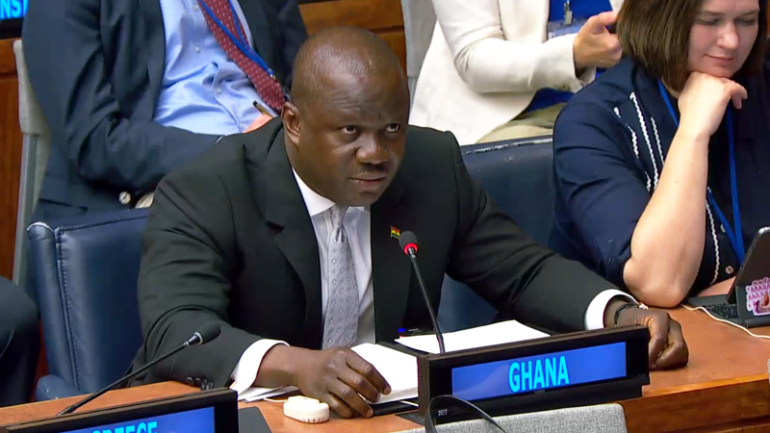Statement by Ghana at United Nations Forum on Forests, 19th session (UNFF19)

- Posted by admin
- Posted in News, Statement & Remarks, UN News
Hon. Samuel A. Jinapor,
Minister for Lands and
Natural Resources, Ghana
United Nations, New York
May 09, 2024
Chair of UNFF19,
Excellencies;
Colleague Ministers;
On behalf of the President of the Republic of Ghana, H.E. Nana Addo Dankwa Akufo-Addo, I want to compliment the Chair and Vice Chairs of the Nineteenth Session of the United Nations Forum of Forests (UNFF19), for steering the affairs of the Forum, at this session, and for the theme chosen for this High-Level Ministerial Policy Dialogue.
Undoubtedly, our world is at a crossroads. Despite the increasing global knowledge and understanding of environmental challenges, we continue to face the triple planetary crisis of climate change, pollution and biodiversity loss, exacerbated by deforestation, desertification, land and soil degradation.
Early this year, in some parts of the African continent, schools had to shut down due to heatwaves. And there are fears that the Horn of Africa may become unhabitable due to these heatwaves, amidst warnings that millions of children in Asia are at risk of diseases and death, due to soaring temperatures.
That forests host up to eighty percent (80%) of the world’s terrestrial biodiversity, can provide a third of global climate solutions, and its capacity to contribute to combating pollution, has never been in doubt. Yet, the world’s forests continue to be under serious threat, with tropical primary forest loss in 2023 alone, totalling, three point seven million hectares (3.7million ha), resulting in two point four gigatonnes of carbon dioxide emissions (2.4GtCO2e). This, obviously, calls for urgent, concerted and collaborative action to save our forests, our planet, and the lives and livelihoods of the one point six billion (1.6 billion) people who depend on forest resources for survival.
Ghana, under the distinguished leadership of President Akufo-Addo, has continued to play a lead role in forest protection, afforestation and reforestation, as well as biodiversity conservation. Under the Ghana Forest Plantation Strategy, some seven hundred and twenty-one thousand hectares (721,000 ha) of degraded forest have been cultivated between 2017 to 2023, and under our flagship Green Ghana Project, where a day is set aside, each year, for the whole country, led by the President of my country, to go planting, over forty-two million (42,000,000) trees have been planted since its implementation in 2021. This year, on the Green Ghana Day, on June 7, we intend to add, at least, an additional ten million trees.
Under the Ghana REDD+ Programme, we were able to reduce emissions reductions by almost one million tonnes of carbon dioxide equivalent (1,000,000 tCO2e), for the first accounting period between June and December, 2019, which has been verified and validated, and for which we have received results-based payment. And as co-Chair of the Forest and Climate Leaders’ Partnership (FCLP), we launched our robust Resilient Ghana Country Package at COP28 in Dubai, United Arab Emirates, to, among others, strengthen agricultural and mining practices, promote aggressive afforestation and reforestation programme, and ensure climate change adaptation and biodiversity conservation.
But I must say, that developing countries, like Ghana, face enormous challenges in championing forest-based solutions to climate change. The main challenge, being financing. It is estimated that some Three Hundred and Ninety-Three Billion US Dollars (US$393 billion) is required, annually, to save the world’s forests. Unfortunately, the tropical domain, which is home to about forty-five percent (45%) of this forest, is inhabited, largely, by developing countries, who are mostly affected by climate change due to the lack of resilient infrastructure and systems. While local communities stand to benefit from the protection of these forests, there is no gainsaying that international gains from the conservation of biodiversity far outweighs the gains to local communities involved in their conservation.
It is, therefore, of utmost importance that we incentivise local communities, who depend on these forests for their livelihood, to protect and conserve them. Over the years, we have had to expend our limited resources for the protection of our forests and the conservation of biodiversity, due to the importance we attach to them. Financing mechanisms, such as the Global Forest Financing Facilitation Network (GFFFN), have not been able to address these challenges, while the global north continue to default on their promises to support the global south on this agenda. There is, therefore, the urgent need to re-examine other financing options, at this midterm review of the effectiveness of the International Arrangements on Forests, in order to stimulate investment efforts towards achieving the globally agreed goals on forests, climate change and biodiversity.
Why should the price of carbon in Europe, for example, be different from Africa, or in the Americas be different from Asia? We must pay the right price for carbon everywhere to incentivise forest countries to develop sustainably, while preserving nature, and not neglecting the pertinent conversation on nature finance. And while technology for extracting carbon dioxide from the atmosphere may sound good, it cannot be a substitute for tropical forests which naturally absorb carbon. Science, technology and innovation must, therefore, contribute to the preservation and conservation of forests and restoration of degraded ones.
As this Forum, also, undertakes a mid-term review of the International Arrangement on Forests, we must commit to accelerating forest action to tackling the triple planetary crises, by redeeming our climate, forest and biodiversity pledges, increase forest finance, and adopt forest-solutions that have proven to have multiplying effect in dealing with global crises.
Excellency Chair, Ghana is fully committed to the attainment of these noble Goals.
I thank you for your attention.
